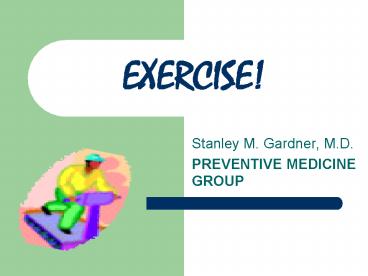EXERCISE - PowerPoint PPT Presentation
1 / 33
Title:
EXERCISE
Description:
Support and strengthen knee in sitting position with leg extended ... If results do not fit preconceived notion, they may go unreported. Benefits of Exercise ... – PowerPoint PPT presentation
Number of Views:17
Avg rating:3.0/5.0
Title: EXERCISE
1
EXERCISE!
- Stanley M. Gardner, M.D.
- PREVENTIVE MEDICINE GROUP
2
EXERCISEPHYSIOLOGY
3
Maximal Exertion
- Increase metabolic rate of muscle 50x
- Increase metabolic rate of body 10x
- Increase cardiac output 4-6x
- Increase heart rate 3x
4
Isometric Exercise
- Increase muscle tension without shortening muscle
length - Increase muscle bulk and strength
- Does not improve conditioning
5
Example
- Support and strengthen knee in sitting position
with leg extended -- adductors, abductors,
hamstrings, quadriceps
6
Isotonic Exercise
- Shorten muscle length with minimal muscle tension
- Improve conditioning and endurance
7
Example
- Walking
8
Low Intensity Exercise
- Releases adrenalin which stimulates free fatty
acids (from triglycerides) to be metabolized as
energy for muscle
9
Aerobic Exercise
- Continuous, rhythmical using large muscle groups
10
Anaerobic Exercise
- Utilizes short bursts of maximal exertion of
muscles
11
High Intensity Exercise
- Aerobic exercise uses muscle glycogen which
breaks down into pyruvate which enters the citric
acid cycle and produces energy.
12
High Intensity Exercise (contd.)
- Anaerobic exercise uses muscle glycogen which
breaks down into lactate which leaves lactic acid
in the tissue and produces less energy.
13
Examples of Low Intensity Exercise
- Walking 2-3 mph
- Bicycling up to 5.5 mph
- Dancing (slow)
- Table tennis
14
Examples of High IntensityAerobic Exercise
- Aerobics (individual or classes)
- Dancing (fast)
- Jogging
15
Examples of High IntensityAnaerobic Exercise
- Sports
- Sprinting
16
PROBLEMS WITH THE STUDIES THAT EVALUATE THE
SCIENCE OF EXERCISE RISKS AND BENEFITS
17
- Pre-selection bias
- Exercise questionnaires do not correlate with
interview - Mixed results of studies
- Difficulty defining the placebo group or control
group of no activity - If results do not fit preconceived notion, they
may go unreported
18
Benefits of Exercise
- Better overall feeling about self, reinforced by
peers - Weight loss is some people
- ¾ of exercisers quite smoking
- Able to do more of the other activities of life,
including running away from peril - Pleasure felt during and after exercise
19
Risks of Strenuous Exercise
- Injuries
- 1/3 of serious runners sustain knee and ankle
strain, stress fractures, muscle tears per year - Males who bicycle more than 3 hours per week have
3x greater incidence of erectile dysfunction
- Sudden Death
20
Common Sense Risksof Exercise
- Heat exhaustion, heat stroke especially with high
humidity hydrate, cooler part of day - Hypothermia wind chill factor
- Exercise induced asthma, hives, anaphylaxis
- Air pollution
- High altitude
21
Benign Side Effects of Exercise
- Hematuria or albuminuria in first void urine
after exercise - Change in menstrual regularity (does not effect
long term fertility) - Incontinence correlates with number of pregnancies
22
COMPONENTSOFPHYSICAL FITNESS
- CARDIOVASCULAR ENDURANCE
- MUSCULAR STRENGTH
- FLEXIBILITY
23
Cardiovascular Endurance
- Intensity 60-90 of maximal heart rate (maximal
heart rate is 220 minus age) - Duration 15-60 minutes
- Frequency 3-5 times per week
24
3 Phasesof Cardiorespiratory Exercise
- Warm-up 5-10 minutes (may include light
calisthenics, stretching) - Conditioning
- Cool-down 5-10 minutes (light conditioning,
stretching)
25
Muscular Strength
- Intensity 5-15 repetitions
- Duration -- 1-3 sets of repetitions
- Frequency Same muscle group 2-3 days apart
abdominals can be done daily
26
Weight Lifting Guidelines
- Warm-up 50 of weight
- Controlled movement (do not throw weight)
- Breathe exhale when lifting inhale when
lowering - Isolate muscle group
27
Flexibility Stretching
- Warm-up Light calisthenics
- Static stretch 30-60 seconds then slowly
progressive stretch - Release if pain
28
SPECIAL CONSIDERATIONS
- Coronary heart disease Start light slowly
increase aerobic weight training - Hypertension Be careful of isometric exercise
29
SPECIAL CONSIDERATIONScontd.
- Diabetes Increases insulin sensitivity watch
for blood sugar drops (keep carbohydrate snack
available) - Obesity Low intensity, long duration, improve
basal metabolic rate may have appetite
suppressant effect
30
SPECIAL CONSIDERATIONScontd.
- Arthritis Short duration high frequency to
improve muscle strength and range of motion do
not stress osteoarthritic joints (try non-weight
bearing swimming, cycling, rowing) - Mental Health Reduces need for medication,
decreases stress, lessens anxiety and depression
31
SPECIAL CONSIDERATIONScontd.
- Pregnancy Maintain pre-pregnancy exercise
program avoid trauma or falls - Chronic pain Endorphin release may modify pain
signaling - Low back pain High resistance without movement,
stretching
32
SPECIAL CONSIDERATIONScontd.
- Elderly All benefits are possible start low
intensity and progress slowly - End stage renal disease Exercise very
important, can be during dialysis watch serum
potassium levels - Chronic obstructive lung disease As tolerated
33
SUMMARY
- Exercise for the fun of it
- Difficult to document improvements in
cardiovascular health longevity - Strenuous exercisers need to listen to their body
as injuries are real































